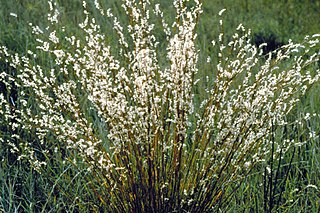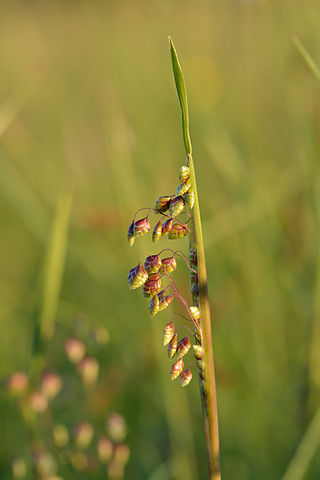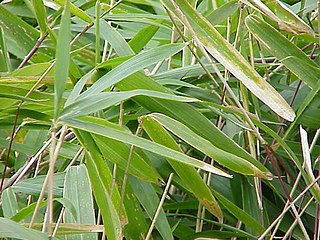
The Andropogoneae, sometimes called the sorghum tribe, are a large tribe of grasses (family Poaceae) with roughly 1,200 species in 90 genera, mainly distributed in tropical and subtropical areas. They include such important crops as maize (corn), sugarcane, and sorghum. All species in this tribe use C4 carbon fixation, which makes them competitive under warm, high-light conditions.

The Bambuseae are the most diverse tribe of bamboos in the grass family (Poaceae). They consist of woody species from tropical regions, including some giant bamboos. Their sister group are the small herbaceous bamboos from the tropics in tribe Olyreae, while the temperate woody bamboos (Arundinarieae) are more distantly related. The Bambuseae fall into two clades, corresponding to species from the Neotropics and from the Paleotropics.

The Pooideae are the largest subfamily of the grass family Poaceae, with about 4,000 species in 15 tribes and roughly 200 genera. They include some major cereals such as wheat, barley, oat, rye and many lawn and pasture grasses. They are often referred to as cool-season grasses, because they are distributed in temperate climates. All of them use the C3 photosynthetic pathway.

Chloridoideae is one of the largest subfamilies of grasses, with roughly 150 genera and 1,600 species, mainly found in arid tropical or subtropical grasslands. Within the PACMAD clade, their sister group is the Danthonioideae. The subfamily includes widespread weeds such as Bermuda grass or goosegrass, but also millet species grown in some tropical regions, namely finger millet and teff.

The Arundinoideae are a subfamily of the true grass family Poaceae with around 40 species, including giant reed and common reed. Unlike many other members of the PACMAD clade of grasses, the Arundinoideae all use C3 photosynthesis. Their sister group is the subfamily Micrairoideae.

Arthrostylidiinae is a subtribe of bamboo. It comprises 15 genera. The plant grows in tropical regions.

Arundinarieae is a tribe of bamboo in the grass family (Poaceae) containing a single subtribe, Arundinariinae, and 31 genera. These woody bamboos occur in areas with warm temperate climates in southeastern North America, Subsaharan Africa, South Asia and East Asia. The tribe forms a lineage independent of the tropical woody bamboos (Bambuseae) and the tropical herbaceous bamboos (Olyreae).

The Bambusinae are a subtribe of bamboo. It comprises 17 genera.

The Guaduinae is a subtribe of bamboo. It comprises 5 recognized genera.

The Melocanninae is a subtribe of bamboo.

The Hickeliinae are a subtribe of bamboo. It comprises nine genera.

Oryzeae is a tribe of flowering plants in the true grass family, Poaceae. It contains 11 genera, including both cultivated rice (Oryza) and wild rice (Zizania).

Oryzoideae (syn. Ehrhartoideae) is a subfamily of the true grass family Poaceae. It has around 120 species in 19 genera, notably including the major cereal crop rice. Within the grasses, this subfamily is one of three belonging to the species-rich BOP clade, which all use C3 photosynthesis; it is the basal lineage of the clade.

Danthonioideae is a mainly southern hemisphere subfamily of grasses, containing the single tribe Danthonieae and one unplaced genus, with altogether roughly 300 species. It includes herbaceous to partially woody perennial or annual (less common) grasses that grow in open grasslands, shrublands, and woodlands. It belongs to the PACMAD clade of grasses, but unlike some other lineages in that clade, grasses in the Danthonioideae exclusively use the C3 photosynthetic pathway. Its sister group is the subfamily Chloridoideae.

Olyreae is a tribe of grasses in the bamboo subfamily (Bambusoideae). Unlike the other two bamboo tribes, Olyreae are herbaceous and do not have a woody stem. Their sister group are the tropical woody bamboos (Bambuseae).

Paniceae is a large tribe of the subfamily Panicoideae in the grasses (Poaceae), the only in the monotypic supertribe Panicodae. It includes roughly 1,500 species in 84 genera, primarily found in tropical and subtropical regions of the world. Paniceae includes species using either of the C4 and C3 photosynthetic pathways, as well as presumably intermediate species. Most of the millets are members of tribe Paniceae.

Micrairoideae is a subfamily of the grass family Poaceae, distributed in tropical and subtropical regions. Within the PACMAD clade, it is sister to subfamily Arundinoideae.

Cynodonteae is a large tribe of grasses in the subfamily Chloridoideae, with over 800 species.

Zoysieae is a tribe of grasses in subfamily Chloridoideae, with around 250 species in four genera. All species use the C4 photosynthetic pathway.

Paspaleae is a tribe of the Panicoideae subfamily in the grasses (Poaceae), native mainly to the tropical and subtropical Americas but with a number of species introduced to other regions. It includes roughly 680 species in 39 genera. Species in this tribe use either of the C3 or C4 photosynthetic pathways.



















